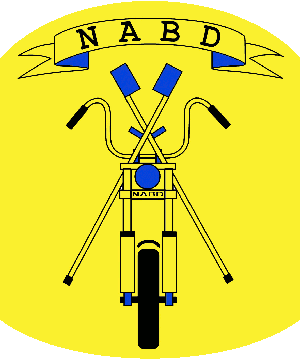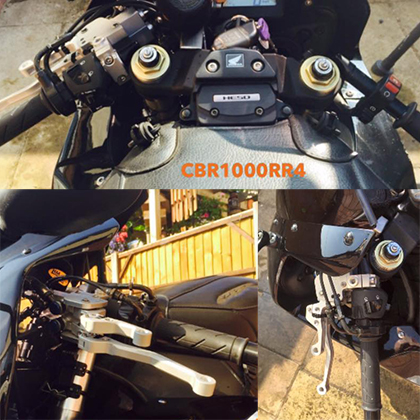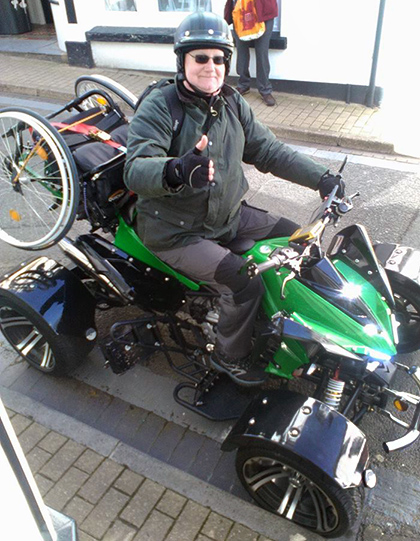 United Kingdom – National Association of Bikers with a Disability (NABD) – Support of people with disabilities who wish to enjoy the freedom and independence of motorcycling
United Kingdom – National Association of Bikers with a Disability (NABD) – Support of people with disabilities who wish to enjoy the freedom and independence of motorcycling
It is about ten months now since I was first contacted by Andy from Exeter. He explained that he had suffered a cerebral abscess in 1984, at the age of fourteen, which had affected his vision, in particular a field of vision to the right of centre; he asked if I could help him to get a provisional licence to ride a motorcycle.
My initial though wasn’t one of great optimism. The DVLA rules on deficiencies in fields of vision are very clearly defined and they have always been strictly enforced. I asked Andy his sight had improved over the thirty-one years since it had been first affected and he said that his sight remained unchanged but he had learned to compensate for the deficiency to the point where it had no effect on his life except the restrictions put on him by authorities like the DVLA.
It has long been the policy of the National Association for Bikers with a Disability (NABD), as well as my own personal belief, that people should be judged on their abilities rather than on any perceived disabilities but with the DVLA have always proven intransigent when it comes to their rules on vision. I was less than optimistic at Andy’s chances of getting a provisional licence and mindful of my own responsibility to ensure that we do not become instrumental in putting somebody on the road who may prove to be a danger to themselves or other road users.
However, when Andy told me that he had lived for several years in Australia in the 1990’s and had passed his test and held a full unrestricted motorcycle licence there, I began to feel a little more hopeful. It appears that the rules on disabilities are slightly different in Australia and they seem to rely more on allowing people to prove their abilities during training and tests rather than adhering to ‘one size fits all’ policies on disabilities.
Andy went on to tell me about his experiences of riding a number of different motorcycles quite extensively around Australia and that he had ridden in the UK for twelve months after his return in the late 1990’s without ever experiencing any difficulties.
As the law only allows 12 months use of a non-EU driving licence in the UK he had then applied to the DVLA for a provisional motorcycle licence to enable him to take the UK motorcycle test. At this point the DVLA told him in no uncertain terms that they would not grant him a provisional licence for any vehicle because of the deficiency in his right field of vision. The fact that he held an unrestricted Australian motorcycle licence had no effect on their decision and they considered the matter closed.
For the next fifteen years or so Andy was reliant on a pedal cycle for transport, which he regularly rode through rush-hour traffic on his way to and from work without ever experiencing any difficulties caused by the damage to his optic nerve. He also took part in a number of charity cycle rides, including one from Edinburgh to Exeter that took in just about every type of road (except motorways of course).
Jumping Through Metaphorical Hoops
Being certain within his own mind that he had developed the ability to compensate fully for his reduced field of vision he never gave up on the idea of returning to motorcycling and in 2015 he began the whole process of applying for a provisional motorcycle licence again.
One essential facet of his application was to provide medical evidence to support his assertion that his deficient sight should not prevent him from riding a motorcycle. Thankfully Andy’s doctor had known him for many years and was happy to provide the necessary medical opinion.
Despite Andy jumping through each of the metaphorical hoops the DVLA Medical Group put before him they remained obstinate in their refusal. This was the stage he was at when he heard about the NABD and got in touch with me.
After hearing his story in detail I agreed to make representations to the DVLA on his behalf but being mindful that this was an extremely unusual case I cautioned him that it was likely to be a long and bumpy ride that may ultimately end in disappointment.
What followed were several, often frustrating, conversations between people at the DVLA Medical Section and myself over a couple of months.
I have often been asked by the DVLA to carry-out motorcycle assessments for them when they were unsure of granting or reinstating a licence and I had, just two weeks prior to this, carried out an assessment for a lady who had suffered a stroke and that assessment had resulted in her motorcycle licence being reinstated for her to ride an adapted trike.
Turning It Up A Notch!
 In late December 2015 Andy received notice that they were going to grant him a provisional licence. It was just a few days late to call it a Christmas present but Andy was overjoyed nonetheless!
In late December 2015 Andy received notice that they were going to grant him a provisional licence. It was just a few days late to call it a Christmas present but Andy was overjoyed nonetheless!
Then just a week or so after New Year he received notice that the decision had been reversed after one of the DVLA doctors had voiced concerns. As you can imagine Andy’s disappointment and anger were as acute as his delight had been just two weeks before!
The next communication I had from the DVLA was that the doctor in question was insistent that Andy should take an assessment in a car at one of the mobility assessment centres. Just to put this into context, Andy had never wanted to drive a car, he had no experience of driving a car and no wish to have a car licence. This struck me, at best, as blatant ignorance on the part of the doctor concerned and, at worst, blatant discrimination. It was time to turn things up a notch!
I spoke to a supervisor at the DVLA and she agreed that a motorcycle assessment would make far more sense but she could not commission me to carry-out a formal assessment without the acquiescence of the doctor involved in the case. I then suggested that I carry-out an informal off-road assessment to add weight to Andy’s case and she agreed that it should go a long way to dispel the doctor’s concerns.
For the informal assessment to carry as much validity as possible I enlisted the help of Dave Williams from Apex Motorcycle Training in Stockport Cheshire. In addition to being a very experienced and highly respected motorcycle instructor he has almost certainly had more experience of working with disabled riders than any other instructor in the UK. His involvement with the NABD goes all the way back to its inception in 1991 and over the past seven or eight years he has been my collaborator in an ever increasing number of assessments and/or refresher/familiarisation courses for bikers who are preparing to return to the road after suffering catastrophic injuries leading to permanent disability.
I also enlisted the help of fellow NABD committee member Gary Seddon to assist in the assessment as an additional pedestrian and/or ‘road hazard’.
As the facility for the off-road assessment was just outside Manchester, Andy had to make the long journey from Exeter to Manchester Piccadilly by train the night before the assessment carrying his helmet, boots leathers and waterproofs and he booked into a travel lodge in the city centre overnight. Gary picked him up the following morning and brought him out to the Apex CBT training facility in Bramhall, Cheshire for a 9:00am start.
It was a dismally grey overcast morning with bouts of drizzle on and off throughout the day. In normal circumstances I would have been a little disheartened by the weather but in this case I was rather delighted because an assessment carried out in low light with fluctuating levels of poor visibility would really put Andy through his paces and highlight any potential issues much better than if it had been a nice clear sunny day. However, the fact that it was also a bloody cold February morning had no advantage to either the assessment or our moods.
Gauging General Riding Ability
Initially Dave put Andy through all of the standard off-road aspects of the standard CBT. This gave us the chance to gauge Andy’s general riding ability and allowed him to get used to riding the 125cc motorcycle that Dave had supplied for the assessment.
Following a couple of hours of CBT manoeuvring and control exercises we warmed-up a little with a short lunch break and then set Andy off riding a circuit while Dave, Gary and myself played the part of rather erratic and unpredictable pedestrians. As Andy traversed the circuit he had to spot and react to a number of pre-arranged hand signals that could be given at any time.
Just to make it even more difficult for Andy I had purposely dressed all in black and I kept my hand signals small. Dave Williams even went to the extent of walking out in front of Andy without any warning to test his reaction time. These exercises were repeated numerous times in both directions and as time went on we got a little meaner with our tests but Andy reacted exactly as he should on every occasion.
At the conclusion of the assessment none of us were in any doubt that Andy had indeed taught himself to compensate for his deficient field of vision to the extent that it had become a natural reflex.
I submitted a report to the DVLA Medical Section a week or so later together with a statement from a supporting Dave Williams. Both my report and Dave’s statement recommended that Andy be granted a provisional licence so that he could take a formal CBT and progress through training and tests. I also submitted video files and photographs taken during the assessment, as this has often proven useful in previous assessments. I could foresee no reasonable excuse for further refusal or delay.
Totally Flabbergasted
 A week or so later I was totally flabbergasted to be told that the doctor was still insistent on Andy taking an assessment in a car because he or she did not think the informal assessment had shown enough interaction with pedestrians and/or other traffic!
A week or so later I was totally flabbergasted to be told that the doctor was still insistent on Andy taking an assessment in a car because he or she did not think the informal assessment had shown enough interaction with pedestrians and/or other traffic!
Once again I was on the phone to the supervisor to point out that not only did Andy have no wish to drive a car but also the fact that the hazard perception and avoidance necessary when riding a motorcycle are markedly different than when driving a car, as indeed are the fields of vision. I also pointed out that while he does not have a provisional licence he cannot properly prove his ability to interact fully with other traffic whether he is in a car or on a motorcycle!
Following this there was a case meeting convened where it was agreed to commission me to carry-out a full formal assessment, to include a full CBT course and a provisional licence was granted temporarily for the duration of the assessment to allow for the on-road aspects of the CBT course and further on-road aspects of the assessment.
Consequently Andy once again had to make the long trip to Manchester and on April 7th 2016 Dave Williams and I put him through a full day of CBT and rigorous assessment, both on and off road, including negotiating some of the most badly pitted roads I have seen in a long time and the notoriously busy roads of Bramhall town-centre. Once again Andy acquitted himself admirably!
I submitted a comprehensive report and the CBT Completion Certificate on April 15th and within two days the decision was made by the DVLA Medical Section to allow Andy an unrestricted provisional licence so that he could practice and progress to taking his test.
On July 22nd 2016 Andy passed his Direct Access test and is now the very proud owner of a full EU motorcycle licence!
Hopefully this case will serve to remind all of the authorities, once again, that people should be judged on their actual abilities rather than their perceived disabilities.
Rick Hulse – NABD Chairman
PS. On July 30th 2016 Andy became the proud owner of a Kawasaki Versys 650. My message to him on that day was: “Be careful out there. Not everybody on the road had to prove their abilities like you did!”
Source – This article was first published in two parts in issues 390 (October 2016) and 391 (November 2016) of Back Street Heroes magazine – Back Street Heroes
Information
Find out more about the National Association of Bikers with a Disability (NABD) – Membership and Affiliation at www.nabd.org.uk
Other Disabled Motorcycle Type Association – Worldwide
Handicaps Motards Solidarité – France – www.handicaps-motards-solidarite.com
Association of Injured Motorcyclists Canada A.I.M. – British Columbia, Canada – www.aimvancouver.com
Downed Bikers Association – United States – downedbikers.com
Likevel MC Norge – Norway – www.likevel.mc.no


Leave a Reply